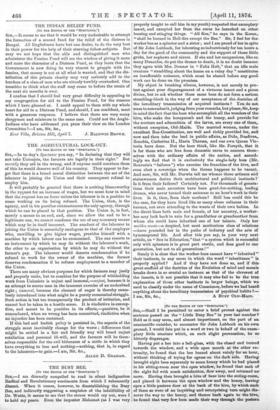THE AGRICULTURAL LOCK-OUT.
[TO THE ,EDITOR OF THE "SPECTATOR.") SIR,—In to-day's Spectator you say, " In declaring that they will not take Unionists, the farmers are legally in their right." But morally they are in the wrong, and if anyone could convince them of this he would deserve well of his country. They appear to for- get that there is a broad moral distinction between the act of the labourer in joining the Uuion and their consequent refusal to employ him.
It will probably be granted that there is nothing blameworthy in the request for an increase of wages, but we must bear in mind that the request has no force unless the labourer is in a position to cease working on its being refused. The Uuion, then, is the agency, and in his peculiar circumstances the only agency, through which he can be placed in that position. The Union is, in fact, merely a means to an end, and, since we allow the end to be a legitimate one, we cannot condemn the use of any necessary means which may be in itself innocent. The conduct of the labourer in joining the Union is essentially analogous to that of the employer who, unwilling to give higher wages, provides himself with a machine by which labour can be economised. The one resorts to an instrument by which he may do without the labourer's work, the other to an organisation by which he may do without the farmer's pay. The labourer would deserve condemnation if he refused to work for the owner of the machine, the farmer deserves condemnation if he refuses employment to a member of the Union.
There are many obvious purposes for which farmers may justly and properly unite, but to combine for the purpose of withholding work from Unionists is unjust and immoral,—unjust, because it is an attempt to coerce men in the innocent exercise of an undoubted right ; immoral, because the element of anger is thereby cause- lesaly introduced into what might be a purely economical struggle. Such action is but too transparently the product of irritation, and cannot but be taken in a hostile sense. It is vindictive in concep- tion, and meant to be punitive in its effects,—punitive, be it remembered, when no wrong has been committed, vindictive when no injustice has been sustained.
If this bad and foolish policy is persisted in, the aspects of the struggle must inevitably change for the worse ; differences that might be settled in a fair and friendly way will breed unjust
retaliation and personal and the farmers will be them- selves responsible for the evil bitterness of a strife in which they have everything to lose and nothing—nothing, that is, in regard to the labourers—to gain.—I am, Sir, &c.,
ALLEN D. GRAIIAM.


































 Previous page
Previous page